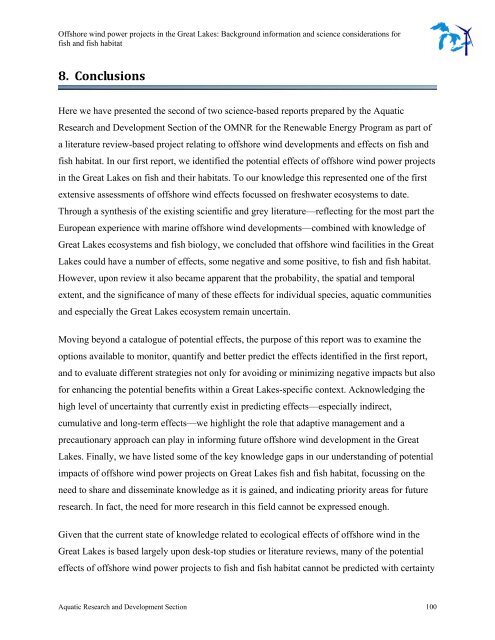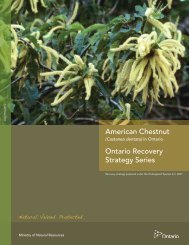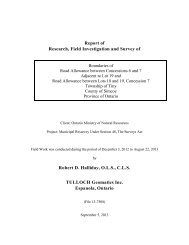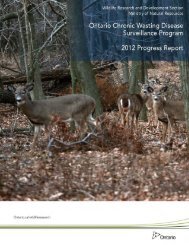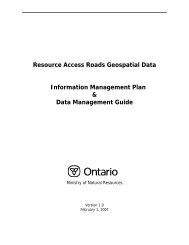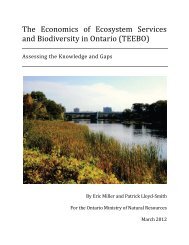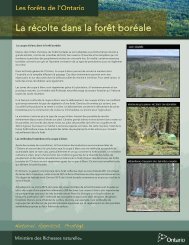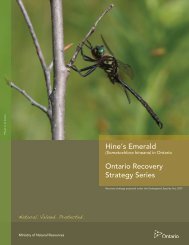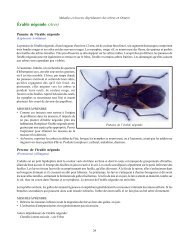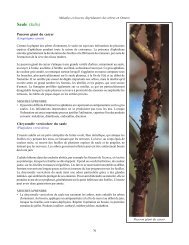Offshore Wind Power Projects in the Great Lakes - Ministry of ...
Offshore Wind Power Projects in the Great Lakes - Ministry of ...
Offshore Wind Power Projects in the Great Lakes - Ministry of ...
You also want an ePaper? Increase the reach of your titles
YUMPU automatically turns print PDFs into web optimized ePapers that Google loves.
<strong>Offshore</strong> w<strong>in</strong>d power projects <strong>in</strong> <strong>the</strong> <strong>Great</strong> <strong>Lakes</strong>: Background <strong>in</strong>formation and science considerations for<br />
fish and fish habitat<br />
8. Conclusions<br />
Here we have presented <strong>the</strong> second <strong>of</strong> two science-based reports prepared by <strong>the</strong> Aquatic<br />
Research and Development Section <strong>of</strong> <strong>the</strong> OMNR for <strong>the</strong> Renewable Energy Program as part <strong>of</strong><br />
a literature review-based project relat<strong>in</strong>g to <strong>of</strong>fshore w<strong>in</strong>d developments and effects on fish and<br />
fish habitat. In our first report, we identified <strong>the</strong> potential effects <strong>of</strong> <strong>of</strong>fshore w<strong>in</strong>d power projects<br />
<strong>in</strong> <strong>the</strong> <strong>Great</strong> <strong>Lakes</strong> on fish and <strong>the</strong>ir habitats. To our knowledge this represented one <strong>of</strong> <strong>the</strong> first<br />
extensive assessments <strong>of</strong> <strong>of</strong>fshore w<strong>in</strong>d effects focussed on freshwater ecosystems to date.<br />
Through a syn<strong>the</strong>sis <strong>of</strong> <strong>the</strong> exist<strong>in</strong>g scientific and grey literature—reflect<strong>in</strong>g for <strong>the</strong> most part <strong>the</strong><br />
European experience with mar<strong>in</strong>e <strong>of</strong>fshore w<strong>in</strong>d developments—comb<strong>in</strong>ed with knowledge <strong>of</strong><br />
<strong>Great</strong> <strong>Lakes</strong> ecosystems and fish biology, we concluded that <strong>of</strong>fshore w<strong>in</strong>d facilities <strong>in</strong> <strong>the</strong> <strong>Great</strong><br />
<strong>Lakes</strong> could have a number <strong>of</strong> effects, some negative and some positive, to fish and fish habitat.<br />
However, upon review it also became apparent that <strong>the</strong> probability, <strong>the</strong> spatial and temporal<br />
extent, and <strong>the</strong> significance <strong>of</strong> many <strong>of</strong> <strong>the</strong>se effects for <strong>in</strong>dividual species, aquatic communities<br />
and especially <strong>the</strong> <strong>Great</strong> <strong>Lakes</strong> ecosystem rema<strong>in</strong> uncerta<strong>in</strong>.<br />
Mov<strong>in</strong>g beyond a catalogue <strong>of</strong> potential effects, <strong>the</strong> purpose <strong>of</strong> this report was to exam<strong>in</strong>e <strong>the</strong><br />
options available to monitor, quantify and better predict <strong>the</strong> effects identified <strong>in</strong> <strong>the</strong> first report,<br />
and to evaluate different strategies not only for avoid<strong>in</strong>g or m<strong>in</strong>imiz<strong>in</strong>g negative impacts but also<br />
for enhanc<strong>in</strong>g <strong>the</strong> potential benefits with<strong>in</strong> a <strong>Great</strong> <strong>Lakes</strong>-specific context. Acknowledg<strong>in</strong>g <strong>the</strong><br />
high level <strong>of</strong> uncerta<strong>in</strong>ty that currently exist <strong>in</strong> predict<strong>in</strong>g effects—especially <strong>in</strong>direct,<br />
cumulative and long-term effects—we highlight <strong>the</strong> role that adaptive management and a<br />
precautionary approach can play <strong>in</strong> <strong>in</strong>form<strong>in</strong>g future <strong>of</strong>fshore w<strong>in</strong>d development <strong>in</strong> <strong>the</strong> <strong>Great</strong><br />
<strong>Lakes</strong>. F<strong>in</strong>ally, we have listed some <strong>of</strong> <strong>the</strong> key knowledge gaps <strong>in</strong> our understand<strong>in</strong>g <strong>of</strong> potential<br />
impacts <strong>of</strong> <strong>of</strong>fshore w<strong>in</strong>d power projects on <strong>Great</strong> <strong>Lakes</strong> fish and fish habitat, focuss<strong>in</strong>g on <strong>the</strong><br />
need to share and dissem<strong>in</strong>ate knowledge as it is ga<strong>in</strong>ed, and <strong>in</strong>dicat<strong>in</strong>g priority areas for future<br />
research. In fact, <strong>the</strong> need for more research <strong>in</strong> this field cannot be expressed enough.<br />
Given that <strong>the</strong> current state <strong>of</strong> knowledge related to ecological effects <strong>of</strong> <strong>of</strong>fshore w<strong>in</strong>d <strong>in</strong> <strong>the</strong><br />
<strong>Great</strong> <strong>Lakes</strong> is based largely upon desk-top studies or literature reviews, many <strong>of</strong> <strong>the</strong> potential<br />
effects <strong>of</strong> <strong>of</strong>fshore w<strong>in</strong>d power projects to fish and fish habitat cannot be predicted with certa<strong>in</strong>ty<br />
Aquatic Research and Development Section 100


